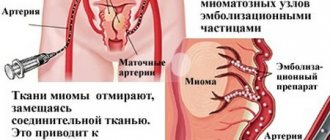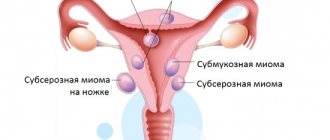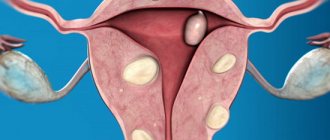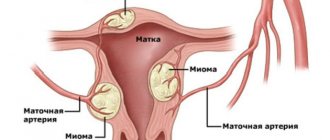What is uterine fibroid
Uterine fibroids (also known as fibroids or leiomyomas) are benign neoplasms that arise inside the muscular layer of the uterus - the myometrium. It is considered one of the most common female pathologies. The frequency of occurrence reaches a quarter of all cases of identified gynecological diseases.
The highest risk of developing fibroids is observed in women in the late reproductive and premenopausal periods. We can say that this is a group of women over the age of 45.
A myomatous node is a cluster of smooth muscle fibers that are closely intertwined. It looks like a round formation. In most cases, it reaches a size of no more than a couple of centimeters, however, in some cases, it can grow profusely and weigh more than a kilogram.
Science knows of a case when a knot reached sixty kilograms in weight.
Doctors distinguish the following types of uterine fibroids:
- Submucosal;
- Subserous;
- Intramural.
Rules for taking contraceptive drugs
When treating fibroids, it is extremely important to follow all doctor’s recommendations. The course and dosage of the medication should be prescribed by a gynecologist, based on the indications of the disease. There are several simple rules that must be followed when taking COCs, namely:
- taking hormonal medications should be started on the first day of menstruation;
- do not exceed the prescribed doses;
- It is not recommended to alternate the course with breaks; after finishing the prescribed regimen, treatment must be continued;
- take the pills systematically, preferably at the same time;
- in case of vomiting, you need to repeat the medication;
- as soon as a woman starts taking COCs, she should be protected with a condom for the first two weeks;
- If the time for taking the drug was missed or you do not remember the last time you took the pill, you need to take the medicine as quickly as possible.
It is worth noting that bleeding and vaginal discharge between periods when taking COCs is not an alarming sign; you must continue the prescribed course . Remember that contraceptives are not a method of treatment, they are intended to prevent conception, and have more of a preventive and anti-symptomatic effect.
Combination drugs are effective if a mini-nodule occurs.
If the tumor size is more than 1.5 cm in diameter, COCs are not used.
In this situation, the correct solution would be to remove the tumor surgically. Today, minimally invasive techniques are actively practiced to reduce pain, the risk of complications and the rehabilitation period.
Oral contraceptives
This group of medications is also called oral contraceptives because they are taken orally, that is, they need to be drunk. They are the most convenient drugs to use.
Today, modern medical products of this class are presented in the form of combined oral contraceptives (COCs) and single-component drugs.
They contain certain female sex hormones that can have different effects on a woman’s body.
Mechanism of action
Their action is reduced to suppressing the secretion of gonadotropic hormones by the pituitary gland, inhibiting folliculogenesis (the process of follicle formation) and suppressing ovulation. Thus, they prevent the development and release of the egg.
Due to the presence of negative feedback from the entry of progestin into the body, there is a suppression of the frequency of release of a hormone such as GnRH, which is produced by the hypothalamus.
Thus, the use of oral contraceptives leads to a decrease in the production of follicle-stimulating and luteinizing hormones by the adenohypophysis. In this regard, there is a decrease in the production of estradiol, and this leads to a disruption in the formation of follicles.
The presence of progestin negative feedback and the absence of positive feedback from the production of luteinizing hormone (LH) leads to suppression of the peak production of LH in the middle of the ovulatory cycle. The combination of these components leads to the suppression of follicle formation and blocks the ovulation process.
In addition to providing protection for sexual intercourse, these products are used as emergency postcoital contraceptives and abortifacients.
The effect of hormonal contraceptives
Birth control pills for uterine fibroids provide effective protection and prevention of various diseases of the reproductive system. The drugs are based on special substances – analogues of female hormones. Myoma develops due to an excess of estrogen and hormonal imbalance. Correctly selected medication and taking the medication according to the prescribed regimen will stop the growth of the node.
Pharmacies offer a wide range of hormonal drugs that are effective for fibroids. They differ in name, composition, dosage and the result obtained. The choice of the appropriate one should be made only after consulting a gynecologist who knows the nature of the disease, the degree of its neglect, the type of node, etc. Artificial hormones, entering the body, block their natural production, which allows stabilizing the hormonal balance. Doctors divide drugs that can affect the tumor into two large groups:
- Combined oral contraceptives for fibroids or COCs. They contain estrogen substitutes and progestogen.
- Monophasic drugs. Their main distinguishing feature is that each tablet contains an equal amount of active substances and active ingredients.
In practice, COCs such as Microlut, Novinet, Marvelon, etc. are more often used; they have proven themselves to be excellent. An effective drug is “Silhouette”.
Treatment of uterine fibroids with drugs
This is a combined contraceptive with an antiandrogenic effect. It is completely absorbed and easily excreted in the urine within 24 hours. The main effect of the tablets is inhibition of ovulation and changes in the structure of the endometrium.
Retail prices for “Silhouette” tablets vary from 650 to 1,600 rubles, depending on the geolocation and packaging of the tablets. Usually packaged from 21 to 63 pieces.
A course of hormone therapy can reduce the manifestations and symptoms of the disease, such as uterine bleeding and pain. In combination with hormonal medications, you can use folk recipes based on herbs, bee products, and herbal ingredients. An integrated approach, diet, limitation of physical activity and exposure to the sun are encouraged.
What other methods are there to prevent pregnancy?
For girls and even women, it is imperative to provide information about the availability of all possible methods of contraception. Today such protection methods are:
- combined oral contraceptives;
- contraceptive injections for women;
- sterilization;
- intrauterine contraceptives (for example, intrauterine devices);
- hormonal patches;
- barrier means (they are the most well-known non-hormonal contraceptives for the population) - condoms, diaphragms, caps, sponges;
- calendar methods;
- method of interrupted coitus.
Spermicides have also worked well.
Before using contraceptives, you should consult a gynecologist. An incorrectly selected drug can significantly harm your health.
How to protect yourself and which method to choose depends on the woman’s desire.
Fibroids and contraceptives
Many women wonder: is it possible to use birth control pills for uterine fibroids? Since the appearance of benign nodular tumors in the uterus is a common disease that occurs in an increasing number of women of reproductive age, the issue of choosing a contraceptive method in the presence of myomatous nodes in the uterus is a priority.
The benefits of contraceptives for fibroids
Modern contraceptives contain synthetic hormones that are similar in properties to the hormones produced by a woman’s body. Regularly using contraceptives for uterine fibroids:
- the growth of existing myomatous tumors slows down;
- no new nodes appear;
- The amount of blood lost during menstruation is noticeably reduced.
Developed disease without proper treatment provokes bleeding, which contributes to the development of anemia in women. In addition, polyps and endometrial hyperplasia are frequent companions of uterine neoplasms.
Contraceptives for the presence of myomatous nodes in the uterus:
- contribute to the treatment of concomitant ailments;
- relieve women from recurrent uterine bleeding;
- increase libido;
- reduce pain during menstruation;
- relieve symptoms of PMS;
- prevent unwanted pregnancy;
- when taken during menopause, they contribute to a faster onset of menopause.
Contraindications
Like any medicine, contraceptives also have contraindications from doctors. Hormonal contraceptive pills are used only to treat sexually active women and are not used for:
- diabetes mellitus;
- heart diseases;
- obesity;
- a history of frequent sore throats and laryngitis;
- migraines and frequent headaches of various etiologies;
- tendency to frequent depression;
- varicose veins and other vascular pathologies;
- hypertension;
- smoking women of any age.
Rules for taking contraceptives
Contraceptive methods with and without fibroids are selected individually by the attending physician, depending on the characteristics of the woman’s body. And yet there are several rules for taking these medications that must be followed.
Contraceptives for fibroids (and in the absence of such pathology):
- cannot be used for self-medication;
- taken daily in three-week courses with a seven-day break;
- consumed daily at the same time.
Which birth control pills are best to take for fibroids?
Gynecologists advise using the following to treat uterine fibroids:
- combined contraceptive drugs based on estrogen and progestogen;
- single-phase tablet preparations;
- non-combined products.
The contraceptive drug and treatment regimen are selected individually by the attending physician.
For small knots
If there are small myomatous nodes in the uterus, any contraceptives are suitable. The choice depends on the characteristics of a particular female body.
For large knots
Not all contraceptives are suitable for women with large myomatous nodes, since large tumors in the uterus lead to its deformation and displacement. In such cases, it becomes impossible to use any intrauterine devices. But oral contraceptives for large-diameter fibroids will not cope with the task. In such cases, more serious hormonal drugs are prescribed, which are selected taking into account individual characteristics.
When combined with other diseases
Often benign neoplasms in the uterus cause other pathological changes in a woman’s body. When choosing contraceptives, you need to take into account all concomitant diseases:
- If bleeding or anemia is present, the use of a hormonal intrauterine device is recommended.
- For endometriosis, combined and monocomponent contraceptives are indicated.
- For cervical erosions, only tablets, patches or injections are suitable.
- For mastopathy, oral contraceptives are ideal.
For the young
For women under 35 years of age, for the treatment of tumors in the uterus and the prevention of unwanted pregnancy, it is recommended to use:
- combined contraceptives in tablet form;
- mini-pill.
But other means can also be used.
For women over 40 years old
After overcoming the 40-year mark, it is advisable not to use products that promote increased estrogen production, as they can contribute to an increase in the size of fibroids. After 40 years, doctors prefer long-acting forms of drugs, or even non-hormonal methods of birth control.
Birth control pills after 40 years reduce the risk of cancer and suppress the negative symptoms of menopause.
After fibroid removal
After removal of myomatous nodes, it is important to take a responsible approach to the issue of contraception. Hormonal agents in various forms are considered optimal during this period, which will prevent the development of new fibroids. The choice depends on the patient’s age and general health.
Possible side effects and complications after taking
An individual approach to the choice of contraceptives for fibroids does not provide a 100% guarantee of the absence of side effects. Women who have concomitant diseases are most prone to complications:
- circulatory system;
- nervous and others.
- Most often, side effects appear as:
- spotting;
- breakthrough bleeding;
- headaches;
- migraine;
- thrombosis;
- thromboembolism;
- decreased libido;
- weight gain.
The appearance of headaches or migraines is an absolute indication for discontinuation of the drug.
Reviews about OK for fibroids
Women of different ages who have used oral contraceptives for fibroids generally give positive reviews about the use of the drugs:
Lyudmila, 39 years old.
“I took birth control pills for 3 years. During this time, the benign neoplasm in the uterus decreased by 6 mm.”
Elena, 34 years old.
“Taking the pills did not cure the fibroid, but completely stopped its growth. I am pleased."
Oksana, 29 years old.
» There is a myomatous node on a stalk in the uterus. The doctor prescribed OK. I've been taking it for three months. Ultrasound showed a slight decrease in the size of the node. I will continue to drink."
matkamed.ru
Hormonal contraceptive pills for uterine fibroids
Hormonal birth control pills not only help protect against unwanted pregnancy, but are also directly used to treat tumors.
The use of drugs in the treatment of fibroids began in the 60s. Contraceptives for women contain hormones identical to natural hormones.
There are monophasic and polyphasic agents.
Hormonal substances entering the body lead to the fact that the production of its own hormones becomes unclaimed. When the medications are discontinued, a cascade of hormonal reactions is restarted and everything falls into place.
Hormonal drugs are good ways to normalize the ovulatory cycle and influence a woman’s health. At the same time, contraceptive pills are used for nulliparous women with the same frequency as for women who have given birth. They are often prescribed to stimulate reproductive function or restore it.
The use of drugs from the group of contraceptives for uterine fibroids allows you to stop its growth in the early stages and completely eliminate it. Such drugs are also called drugs that resolve fibroids.
In addition, these drugs are indicated to be taken after removal of fibroids.
Contraception for fibroids
Most contraceptives include analogues of the female sex hormones progesterone and estrogen. It is also known that fibroids are hormone dependent. It grows precisely when estrogen levels increase. However, a lot depends on the level of progesterone. If estrogen is increased relative to progesterone, then the fibroid grows.
On the other hand, modern combined contraceptives do not have such an effect. They do not increase estrogen levels in the blood. On the contrary, their correct (in accordance with the menstrual cycle) intake can normalize hormonal balance. And, in addition, restore the menstrual cycle disrupted by fibroids. Moreover, some conservative treatment regimens for such neoplasms involve the use of combined oral contraceptives.
Types of fibroids in the uterus
At the age of up to 40 years, they can protect against unwanted pregnancy and normalize the cycle. After the age of 40, they are able to ease the course of menopause and the period before its onset. In any case, a properly selected contraceptive can have a positive effect on the body with fibroids.
Which birth control pills are best to take for uterine fibroids?
The situation with hormonal contraceptives is the same as, for example, with technology: the newer the drug, the better the effect. If the drugs that existed before gave a good effect, but led to specific negative consequences (and this is not only obesity), then the new generation of drugs does not lead to this. Yes, yes, they don’t make you fat!
As already mentioned, there are two groups of hormonal contraceptives. The first is drugs from the group of combined oral contraceptives (COCs). The second includes monocomponent drugs, also known as “mini pills”.
Based on the name, it becomes clear that the first group contains two hormones, and the second group contains one.
Here are the most common remedies from each group.
Combined contraceptives include:
- Janine (a combination of Ethinyl estradiol and Dienogest);
- Median (combining Drospirenone and Ethinyl estradiol);
- Novinet (Ethinyl estradiol and Desogestrel);
- Rigevidon (a combination of Ethinyl estradiol and Levonorgestrel);
- Silhouette (Dienogest and Ethinylestradiol are combined) and others.
Monophasic drugs include:
- Charosetta;
- Micronor;
- Continuin and others.
Separation of COCs by dosage
This group of drugs, depending on the dose of the active substance they contain, is divided into three groups:
- microdosed;
- low-dose;
- highly dosed.
But there are cases when, depending on the dose, one drug may belong to different groups, for example Mifepristone 50 mg, 200 mg, 10 mg. It is the dosage of 50 mg that is used in the treatment of uterine fibroids.
How to use hormonal drugs for fibroids
The drug must be taken every day, at approximately the same time of day, for 21 or 28 days, depending on the drug: mono-, two- or three-phase. During the week after 21 days, the so-called “menstrual reaction” occurs. What makes it easy to use is that each tablet on the plate corresponds to a calendar day.
If the plate contains 21 tablets, then taking the drug should start on the first day of menstruation, and after the end, take a week’s break. During this period, there is no need to use other types of contraception. If you have been prescribed a drug containing 28 tablets in its package, then it is taken continuously. Before taking, you should consult a gynecologist. You can get a huge amount of information on our website or make an appointment.
Birth control pills for uterine fibroids after 40
At this age, a woman’s reproductive function begins to fade. She begins to have problems with the ovulatory cycle, menstruation becomes irregular, hot flashes, sweating and other symptoms characteristic of menopause occur. This indicates the imminent onset of menopause.
It turns out that there is no point in taking contraceptives for such women? Not at all. Their use, on the contrary, is recommended by many doctors. In this way, a woman not only protects herself from pregnancy, but also significantly improves her health.
The use of such drugs allows:
- Reduce the likelihood of tumors;
- Normalize the menstrual cycle;
- Get rid of the symptoms of premenstrual syndrome;
- Reduce pain during menstruation.
The age of entering menopause is highly individual, but most often it occurs after forty-five years. Smoking, alcohol abuse, the influence of negative environmental factors, unhealthy lifestyle, and genetic factors can “rejuvenate” menopausal age.
Effect of contraceptives
Before the age of 40, birth control pills for uterine fibroids produce their main effect - protection against unwanted pregnancy. In addition, if they are chosen correctly, taking them can normalize hormonal balance and stop the growth of fibroids. They also significantly influence the severity of symptoms.
Normalize the menstrual cycle, reduce the intensity of menstruation and bleeding. Sometimes even the pain syndrome becomes less pronounced. It is for this reason that some types of birth control are used as therapy to treat tumors in the uterus.
In women over 40 years of age, another positive effect is possible. In addition to preventing unwanted pregnancy and having a positive effect on fibroids, the tablets have the following effects:
- Reducing the risk of cancer;
- Increasing bone density by normalizing hormonal balance;
- Reduced mood swings for the same reason;
- Improvement in general condition – absence of fever, sweating;
- Increased sexual desire;
- Elimination of insomnia;
- Reduced anxiety and improved mood.
It is important to remember that you need to select the drug very carefully. It is better if a doctor does this. After the age of 40, drugs that increase estrogen production are not advisable. After all, they can negatively affect fibroids and accelerate their growth.
Contraceptives for uterine fibroids and endometriosis
Endometriosis is the abnormal growth of the endometrium, both in the organs of the reproductive system and beyond.
The main cause of the development of endometriosis, as well as uterine fibroids, is an imbalance of female sex hormones. This suggests that using hormonal contraceptives for these pathologies is not only possible, but necessary.
The selection of necessary medications is carried out by a gynecologist individually for each woman. Before this, you must undergo a gynecological examination and pass the tests necessary to determine your hormonal status.
Patients who have been prescribed such medications need to take them systematically and be regularly monitored by a gynecologist.
Effectiveness of birth control pills after 40 years
Women often wonder whether it is possible to take birth control pills after 40 years of age? Doctors are unanimous in the opinion that the use of oral contraceptives is not only necessary, but also useful, because it has an excellent therapeutic effect. They not only prevent the conception of a child, but also have a beneficial effect on overall well-being, the body as a whole becomes more vigorous and healthier.
If you systematically use contraceptives after forty years, this will allow you to appreciate numerous benefits, namely:
- reducing the risk of developing cancer;
- antisymptomatic effect;
- normalization of the menstrual cycle;
- reducing the manifestations of pain and PMS.
It is believed that a woman enters menopause at the age of 45-50 years. This age indicator is of a purely individual nature. Often, under the influence of bad habits, ecology or genetic predisposition, menopause occurs earlier. During this period, menstruation may be absent, but the ability to conceive is still preserved.
The use of contraceptives after 40 years eliminates the possibility of pregnancy, and also helps reduce the negative manifestations of menopause - hot flashes, spotting, pain in the lower abdomen, etc.
Before a doctor prescribes oral contraceptives to a patient aged 40+, he needs to conduct an examination to find out whether the woman smokes, whether she has diseases of the cardiovascular system, whether she has a regular sexual life, and whether there are tumor formations. The state of immunity plays an important role. If it is weakened, the absorption of drugs is impaired, which reduces the effectiveness of the drugs.










